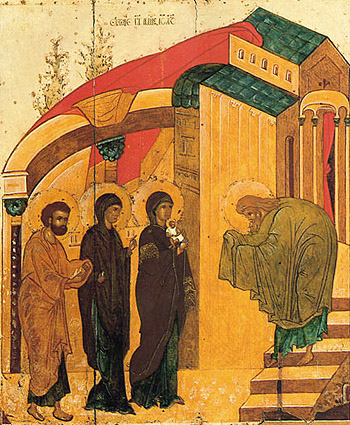 At Christmas we celebrated the coming of God among us as a little baby, the Creator of all things taking on the form of a creature. At the Epiphany, we celebrated the manifestation of this good news to all mankind. What is it, though, that we celebrate on this Feast of the Presentation of the Lord, which rounds off the Christmas cycle?
At Christmas we celebrated the coming of God among us as a little baby, the Creator of all things taking on the form of a creature. At the Epiphany, we celebrated the manifestation of this good news to all mankind. What is it, though, that we celebrate on this Feast of the Presentation of the Lord, which rounds off the Christmas cycle?The Temple, I think, has a central part to play in how we are to understand the meaning of this feast. At one level, it reminds us that the Incarnation does not simply entail God taking up a human nature, but his entering into the particularity of our lives: he is in born in a particular time and place, the member of a particular nation with its own particular traditions and customs, such as the redemption of the first-born.
More than that, though, it is a sign of Jesus’ role of fulfilling the Old Testament in himself: after all, it’s not that he had to be born as a member of some particular people, and it happened to be the Jews. Rather, the whole history of the people of Israel, the whole of the Old Testament, prepared the way for his coming: the prophet Malachi speaks, in today’s first reading, of the Lord who will suddenly come to his Temple (Mal 3: 1), and the righteous Simeon was ‘awaiting the consolation of Israel’ (Lk 2: 25).
There is still a further significance to Jesus coming into the Temple, however, for the Temple is the place where the God who revealed himself to the people of Israel is to be worshipped, and where his name (i.e. in some sense, his presence) is said to dwell (e.g. 2 Chron 6: 10). Jesus being brought into the Temple, then, fulfils its true purpose: now God is truly present in it, as Simeon recognises, and so he is able to give true worship to God in the words which we say every night at Compline, the Nunc dimittis.
So what are we celebrating, then? It is the entrance of God into the particularity of human history, a history which he has guided and shaped by his Providence, and which reaches its fulfilment in the coming of Christ: as Jesus is brought into the Temple, we see that God is now truly among us, and enables us to offer truly acceptable worship to God (cf. Mal 3: 4) by uniting it to the one acceptable sacrifice of his Son.
Thanks for this text about one of my favourite feasts of the Christmas cycle. The presentation of the Lord is called Kyndelsmäss in Swedish which means Candle mass since Jesus is the Light of the world. In acoordance to that name people bring candles to the church and especially children light them I loved it as a kid and look forward to the mass tomorrow, as we celebrate Candle mass on the Sunday after 2/2 since 1793.
ReplyDelete